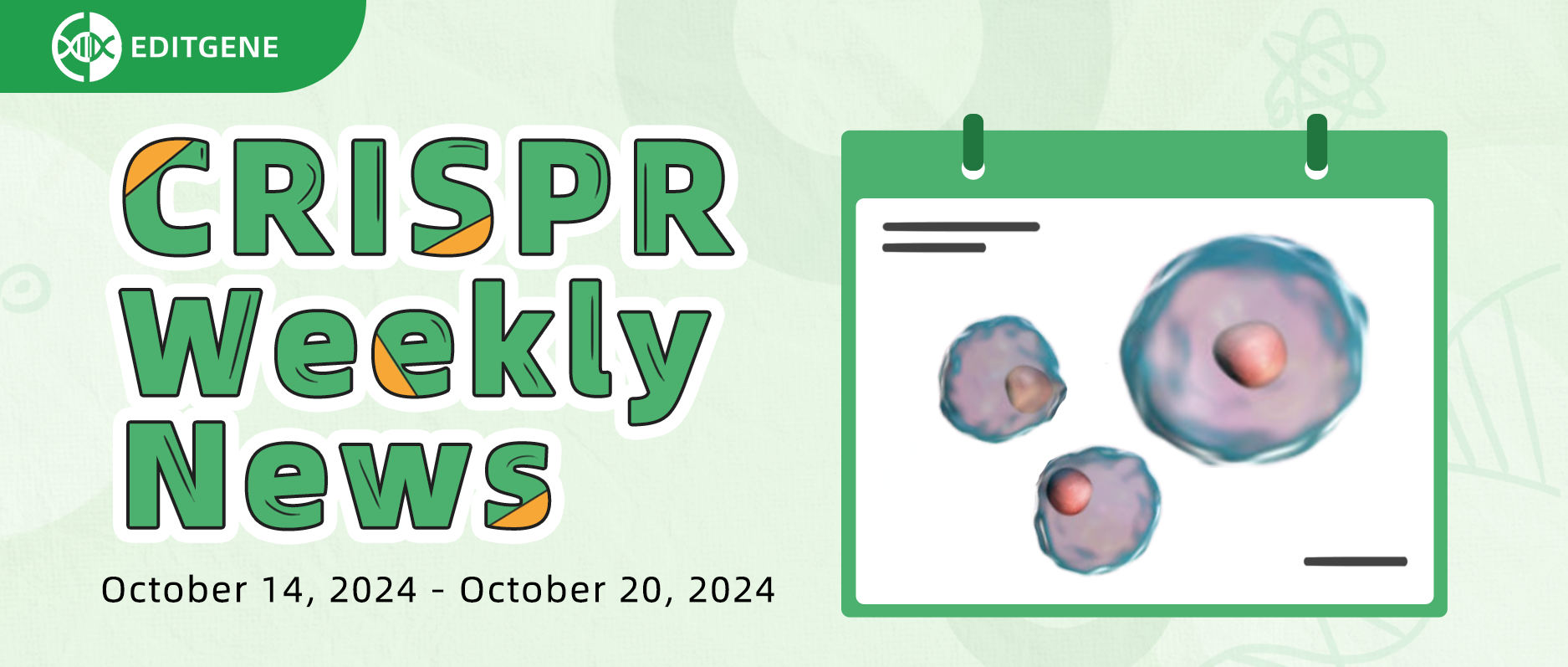[Weekly News] CRISPR/Cas9 Screening Unlocks Secrets of Stem Cell Power

CRISPR/Cas technology is a revolutionary tool in modern biological sciences, with applications spanning medicine, agriculture, environmental conservation, and more. New findings and case studies continue to emerge across these fields. Our 'CRISPR Weekly News' column brings you the latest research and industry updates. Here's a brief summary of the past week's highlights:
I. Research Updates
Title: Parallel genome-scale CRISPR-Cas9 screens uncouple human pluripotent stem cell identity versus fitness
Journal: Nature Communications (Impact Factor: 14.7)
Original Link: https://doi.org/10.1038/s41467-024-53284-4
Pluripotent stem cells (PSCs) have the potential for unlimited self-renewal and differentiation into all body cell types, which requires a specific gene expression profile to maintain these characteristics. Researchers employed CRISPR-Cas9 screening to systematically distinguish between two categories of genes using two different human pluripotent stem cell lines in separate screens: genes critical for stem cell identity (maintaining markers like Oct4, Sox2, Nanog) and those affecting cell fitness (growth and survival) without directly maintaining pluripotency. By separating these gene functions, future efforts can optimize PSC culture conditions and develop more effective stem cell therapies. The study also uncovered the complex relationship between cell growth and pluripotency, providing new insights into mechanisms of cell fate determination.
ii. CRISPR Knockout Cell Lines
1. Title: CdSe Quantum Dot-Based Delivery System for CRISPR-Cas9 Mediated Microglial Gene Modulation
Journal: ACS Applied Nano Materials (Impact Factor: 5.3)
Original Link: https://doi.org/10.1021/acsanm.4c04586
Microglia are the immune cells of the central nervous system, playing a crucial role in neuroinflammation and neurodegenerative diseases. Cadmium selenide quantum dots (CdSe QDs) can enhance the biocompatibility and cellular uptake of drugs or gene carriers. Researchers combined CdSe QDs with the CRISPR/Cas9 system to evaluate their transfection efficiency and gene modulation outcomes in microglia. The results demonstrated that CdSe QDs significantly improved the transfection efficiency of the CRISPR/Cas9 system in microglial cells. The regulated genes showed marked changes, confirming the effectiveness of this system in microglial gene modulation. This CdSe QD-based CRISPR-Cas9 delivery system provides a novel strategy for gene therapy in microglia-related diseases, with potential applications in treating neurodegenerative diseases, neuroinflammation, and other central nervous system disorders.
2. Title: High-fidelity PAMless base editing of hematopoietic stem cells to treat chronic granulomatous disease
Journal: Science Translational Medicine (Impact Factor: 15.8)
Original Link: https://doi.org/10.1126/scitranslmed.adj6779
Chronic granulomatous disease (CGD) is an inherited immunodeficiency disorder, primarily caused by mutations in the NADPH oxidase complex gene, which is critical for immune system function. CRISPR/Cas9 typically relies on a Protospacer Adjacent Motif (PAM) to locate DNA cleavage sites, but the requirement for PAM sequences can limit its editing capabilities in specific gene regions. Researchers developed a high-fidelity PAMless base editing technology to repair CGD-related mutations in patient hematopoietic stem cells (HSCs). This CRISPR-derived tool allows precise base conversions (e.g., C→T or A→G) without double-strand DNA breaks, enabling targeted gene repair or mutation correction. The study showed that in vitro repaired HSCs could effectively differentiate into healthy immune cells, suggesting the potential for long-term CGD treatment, though further clinical trials are needed to assess the safety and efficacy of this gene therapy.
iii. CRISPR Detection
1. Title: One-base-mismatch CRISPR-based transistors for single nucleotide resolution assay
Journal: Biosensors and Bioelectronics (Impact Factor: 10.7)
Original Link: https://doi.org/10.1016/j.bios.2024.116548
Single nucleotide polymorphisms (SNPs) or single-base mismatches play crucial roles in the genetic background of many diseases and personalized medicine. However, detecting single-base differences (e.g., A to G) with high precision remains challenging, especially with the need for simple, rapid, and highly sensitive methods. Traditional techniques often involve complex procedures or expensive equipment. Researchers developed a high-resolution biosensor platform by combining CRISPR detection technology with a field-effect transistor (FET) system to detect single-base changes (SNPs or mismatches) in DNA sequences. The FET is highly sensitive to changes in electrical signals, and when the CRISPR system recognizes a single-base difference, the conductivity of the FET changes. This platform determines the presence of base mismatches through these electrical signal variations, improving detection resolution and sensitivity while simplifying the genetic testing process, showing great potential in biomedical applications.
2. Title: Harnessing noncanonical trans-cleavage characteristics of Cas12 and Cas13a to enhance CRISPR-based diagnostics
Journal: Communications Biology (Impact Factor: 5.2)
Original Link: https://doi.org/10.1038/s42003-024-07000-z
The nucleic acid recognition and cleavage capabilities of the CRISPR/Cas system make it promising for detecting specific pathogens or mutations. Researchers explored the trans-cleavage activities of Cas12a, Cas12f1, and Cas13a in molecular diagnostics. The study showed that Cas13a could directly target DNA, increasing the sensitivity of single-base mismatch detection. Both Cas12a and Cas13a are activated by distinct RNA and RNAduplexes, while Cas12f1 exhibits intrinsic RNase activity without activation. Leveraging these characteristics, the researchers developed new diagnostic tools that activate Cas12 or Cas13a trans-cleavage activity in the presence of target nucleic acids, releasing fluorescent signals for detection. These tools demonstrated high specificity without false positives when tested against various background nucleic acids. Compared to traditional methods, Cas12- and Cas13a-based diagnostics offer greater sensitivity and lower operational complexity, showcasing the potential of noncanonical trans-cleavage characteristics in CRISPR diagnostics for developing efficient and sensitive nucleic acid detection methods.
iv. Other CRISPR-Related Research
1. Title: CRISPR/Cas13 sgRNA-Mediated RNA–RNA Interaction Mapping in Live Cells with APOBEC RNA Editing
Journal: Advanced Science (Impact Factor: 14.3)
Original Link: https://doi.org/10.1002/advs.202409004
The CRISPR/Cas system, especially Cas13, has been widely used in RNA research for its specificity and efficiency. RNA–RNA interactions play a crucial role in cell function, gene expression regulation, and biological signaling. Traditional methods often struggle to monitor these interactions in real-time within live cells. Researchers designed specific sgRNAs with the CRISPR/Cas13 system that bind to target RNA, allowing Cas13 to localize to specific RNA sites and monitor interactions. They then introduced the APOBEC RNA editing enzyme, which can edit specific RNAs to help identify interacting partners. This combination enables real-time tracking of RNA interactions and analysis of their dynamic changes and biological functions in cells. The approach not only enhances the precision of RNA interaction studies but also provides a new tool for understanding gene regulation and cellular functions.
2. Title: Mutation-Specific CRISPR Targeting with SaCas9 and AsCas12a Restores Therapeutic Sensitivity in Treatment-Resistant Melanoma
Journal: The CRISPR Journal (Impact Factor: 3.7)
Original Link: https://doi.org/10.1089/crispr.2024.0003
Melanoma is a highly aggressive skin cancer that often initially responds to immunotherapy and targeted treatments, but many patients eventually develop resistance. Researchers employed SaCas9 and AsCas12a CRISPR/Cas systems, designing mutation-specific sgRNAs to target resistant melanoma cells and assess gene editing efficiency and restoration of drug sensitivity. By precisely targeting mutations, the CRISPR approach not only restored sensitivity to treatments but also offered a new strategy for personalized therapy. The study demonstrated that mutation-specific CRISPR targeting with SaCas9 and AsCas12a effectively restored drug sensitivity in treatment-resistant melanoma, paving the way for new directions in cancer gene therapy.
II. Industry News
1. Intellia Therapeutics will host a webcast on October 24 to review and highlight Phase 2 clinical data for NTLA-2002, a CRISPR/Cas-based gene therapy targeting hereditary angioedema (HAE). The therapy aims to prevent HAE attacks by inactivating the KLKB1 gene, which encodes the precursor protein for kallikrein. Additionally, the company will present at the 2024 American Academy of Allergy, Asthma & Immunology Annual Meeting.
2. Poseida Therapeutics announced the launch of a new dual CAR-T candidate for treating hematologic cancers, including multiple myeloma, under its partnership with Roche. This candidate received a $15 million milestone payment from Roche. The therapy utilizes Poseida's non-viral gene delivery system to insert two chimeric antigen receptor (CAR) genes into T stem cell memory cells (TSCM). Poseida plans to share updates on its CAR-T programs at the Cell Therapy R&D Day in November 2024.
EDITGENE focuses on CRISPR technology, offering a range of high-quality gene editing services and in vitro diagnostic products.
These include but are not limited to: CRISPR Library Screening, Cell Line Engineering, Monoclonal Cell Line Screening, CRISPR Detection.
We are committed to providing the most efficient technical services for CRISPR-related, gene function research, in vitro diagnostics, and therapeutic research.
Recent Blogs:
2.[Weekly News] Breakthrough gRNA Algorithm Supercharges CRISPR Detection Sensitivity
3.[Literature Review] CRISPR Screening Reveals Aging Regulators in Neural Stem Cells
Follow us on social media
Contact us
+ 833-226-3234 (USA Toll-free)
+1-224-345-1927 (USA)
info@editxor.com









![[Weekly News] CRISPR/Cas9 Screening Unlocks Secrets of Stem Cell Power](/uploads/20241026/6xbdKmH0n2aRtLcX_ce9a01bd08f9d18c7d09fad585bc559f.jpg)

Comment (4)